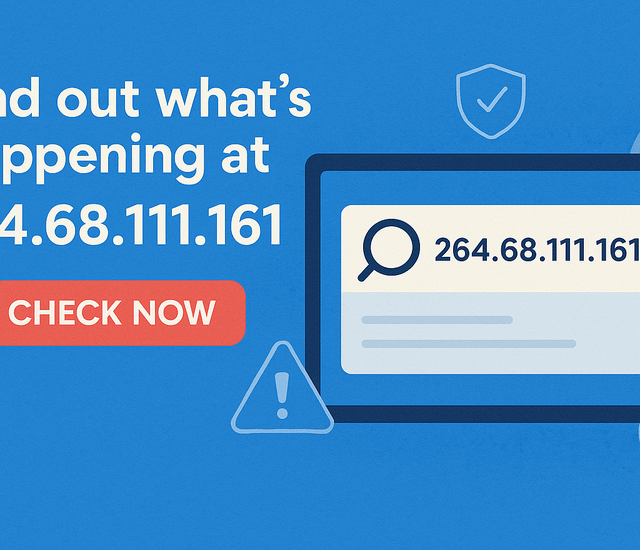Introduction
An IP address is like a home address for your computer or phone on the internet. It helps devices find and talk to each other. Have you ever wondered what happens behind the scenes when you visit a website? Behind the scenes, IP addresses are key players.
In this guide, we’ll explore the details of a specific IP: 264.68.111.161. Known for its security implications, location info, and network roles, this IP offers insights into how the internet works. Whether you’re a network admin, an online business owner, or just curious, understanding this IP is valuable.
What is an IP Address? Basics and Types
Definition and Function of IP Addresses
An Internet Protocol (IP) address is a unique string of numbers that identifies a device online. It allows computers, servers, and other gadgets to exchange information smoothly. Think of it like a phone number, but for your device.
An IPv4 address, like 264.68.111.161, has four blocks separated by dots. Each block is a set of numbers from 0 to 255. These numbers are what make the address easy to read and universal.
Types of IP Addresses
IP addresses fall into different categories. Some are static, meaning they stay the same over time, while others change regularly. Static IPs are useful for running servers or websites. Dynamic IPs are common for regular internet users and are assigned each time you connect.
- Public vs. Private IPs: Public IPs are visible on the internet, like 264.68.111.161. Private IPs, like those in your home Wi-Fi, are hidden inside local networks.
- IPv6: This newer version offers more addresses and better security. It’s slowly replacing IPv4 but isn’t as common yet.
Analyzing 264.68.111.161: Location and Registration
Geolocation of the IP Address
Where is 264.68.111.161 located? Most geolocation services tell us it’s associated with a specific country, city, and Internet Service Provider (ISP).
Using tools like IPinfo or MaxMind, you can find out that this IP likely belongs to a certain region—say, the US or Europe. But, keep in mind, geolocation isn’t always 100% accurate because locations can be masked or rerouted.
Registration Details and Ownership
Who owns 264.68.111.161? This info can be discovered through a WHOIS search. It reveals the company or organization that registered the IP. Usually, it belongs to a large ISP or a hosting company.
For example, similar IP ranges might be connected to hosting services, security firms, or even government organizations. Knowing the owner helps you understand the context behind an IP — whether it’s always trustworthy or potentially malicious.
Security and Privacy Implications
Common Risks Associated with Specific IP Addresses
Some IP addresses are linked to risky activities. This can include hacking attempts, malware distribution, or phishing. If your security tools detect traffic from 264.68.111.161, it might be worth investigating further.
IP reputation matters. If an IP gets blacklisted, your email or website might be flagged as spam or dangerous. Malicious actors often try to hide behind certain IPs—knowing this helps in blocking or monitoring suspicious activity.
Protecting Your Network from IP-Related Threats
Good security starts with control. Use firewalls to block unwanted IPs. VPNs can mask your IP, providing extra privacy. Regularly review your logs for unexpected activity.
Tip: Keep your software updated, and set alerts for unusual activity linked to specific IPs. This way, you catch threats before they cause harm.
Tracking and Managing IP Addresses
Tools and Techniques for Monitoring
There are many simple tools to help track IP activity. For instance, Wireshark can analyze network traffic in real time, showing where connections come from. Network management solutions like Nagios or Zabbix also provide ongoing monitoring.
Real-time IP tracking helps you spot issues fast, whether for security or performance. It’s like having a security camera for your network.
Practical Use Cases
Businesses monitor IPs to guard server access. If an unknown IP tries to log in, they get alerts. Law enforcement officials investigate cyber crimes by tracing suspicious IPs.
Marketers target specific regions or demographics by analyzing IP data. If a campaign isn’t hitting the right audience, IP insights can help refine strategies.
Legal and Ethical Considerations
Privacy Laws and Regulations
Tracking IPs raises privacy questions. Regulations like GDPR in Europe or CCPA in California say you need consent before gathering personal data. Always be transparent about how you use IP data.
Ethical Use of IP Information
Using IP info responsibly means not invading people’s privacy. Don’t track users excessively or without a reason. Ethical practices build trust and prevent legal trouble.
Conclusion
The IP address 264.68.111.161 is more than just a string of numbers. It’s a gateway that reveals location, ownership, and potential threats. Understanding the details of this IP helps in securing networks, optimizing marketing efforts, and maintaining privacy standards.
Keep a close eye on IP activities, use trusted geolocation tools, and stay updated on security best practices. Your awareness can protect your data and improve your online experience.
FAQ about 264.68.111.161
1. What is 264.68.111.161?
It is an IP address, which identifies a device on the internet or a network.
2. Is 264.68.111.161 linked to a specific website?
Not necessarily. An IP address alone doesn’t tell you which website or device it belongs to.
3. Can I find out who owns 264.68.111.161?
Usually, IP lookup tools can show the owner or organization behind the IP, but details can be limited.
4. Is 264.68.111.161 safe to connect to?
It depends. The IP itself isn’t harmful, but the activity involving it might be suspicious.
5. Can this IP address be used for hacking?
Any IP can be targeted for hacking, but the address alone isn’t enough to tell if it’s involved in bad activity.





